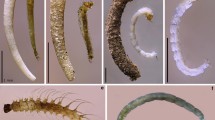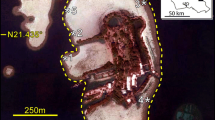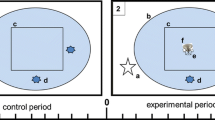Abstract
Organisms that settle and grow on other organisms (i.e., epibionts) are often costly to their hosts in terms of locomotion, growth, and/or reproduction. Such costs can potentially result in biotic resistance against invasion when native epibionts colonise non-native hosts, but examples are rare. Here, we examine the extent to which native acorn barnacles Balanus glandula that grow on the non-native Japanese mud snail, Batillaria attramentaria, may offer biotic resistance against this invader. We conducted population surveys, mark-recapture experiments, and behavioural observations in British Columbia, Canada, to measure the effects of barnacles on the movement, growth, and recapture rate, a potential proxy of short-term survival, of mud snails. One-third of mud snails carried barnacles, the weight of which sometimes exceeded the weight of the mud snail carrying them. Barnacle presence, weight, and the ratio of barnacle to snail weight all decreased the probability that mud snails would move, which could have implications for the foraging success of mud snails carrying barnacles. The slopes of the relationship between shell weight and length were similar for mud snails with and without barnacles, suggesting a lack of effect on growth allometry. The probability of recapture was 36% higher for mud snails without barnacles in one of two trials (i.e., 68% probability of recapture for snails without barnacles vs 50% for snails with barnacles), which reflects weak evidence for a small detrimental effect on mud snails carrying barnacles. Overall, native barnacles appear to offer some, though weak, biotic resistance to invasive mud snails, providing new insight into the potential for ecosystems to resist invasions through epibiotic interactions.




Similar content being viewed by others
Data availability
The raw data and code are available at https://github.com/hannahvwatkins/snails-and-barnacles.
References
Abelló P, Villanueva R, Gili JM (1990) Epibiosis in deepsea crab populations and behavioral characteristics of the host. J Mar Biol Assoc 70:687–697
Alofs KM, Jackson DA (2014) Meta-analysis suggests biotic resistance in freshwater environments is driven by consumption rather than competition. Ecol 95(12):3259–3270. https://doi.org/10.1890/14-0060.1
Behrens Yamada S (1982) Growth and longevity of the mud snail Batillaria attramentaria. Mar Biol 67:187–192. https://doi.org/10.1007/BF00401284
Bell C, McQuaid CD, Porri F (2015) Barnacle settlement on rocky shores: substratum preference and epibiosis on mussels. J Exp Mar Biol Ecol 473:195–201. https://doi.org/10.1016/j.jembe.2015.09.006
Brooks ME, Kristensen K, van Benthem KJ, Magnusson A, Berg CW, Nielsen A, Skaug HJ, Maechler M, Bolker BM (2017) glmmTMB balances speed and flexibility among packages for zero-inflated generalized linear mixed modeling. R J 9:378–400. https://doi.org/10.3929/ethz-b-000240890
Burgueño Sandoval GM, Narvarte MA, Nahuel Firstater F (2021) Epibiosis in sedimentary coastal environments: Effects of an introduced barnacle on a native mussel. Mar Ecol 42:e12674. https://doi.org/10.1111/maec.12674
Buschbaum C, Reise K (1999) Effects of barnacle epibionts on the periwinkle Littorina littorea (L.). Helgol Mar Res 53:56–61. https://doi.org/10.1007/PL00012138
Buschbaum C, Saier B (2001) Growth of the mussel Mytilus edulis L. in the Wadden sea affected by tidal emergence and barnacle epibionts. J Sea Res 45:27–36. https://doi.org/10.1016/S1385-1101(00)00061-7
Byers JE (1999) The distribution of an introduced mollusc and its role in the long-term demise of a native confamilial species. Biol Invasions 1:339–352. https://doi.org/10.1023/A:1010038001768
Byers JE (2000) Competition between two estuarine snails: Implications for invasions of exotic species. Ecol 81:1225–1239. https://doi.org/10.1890/0012-9658(2000)081[1225:CBTESI]2.0.CO;2
Climate Canada (2022) Historical data. https://climate.weather.gc.ca/historical_data/search_historic_data_e.html
Creed RP, Brown BL, Skelton J (2022) The potential impacts of invasions on native symbionts. Ecol 103:e3726. https://doi.org/10.1002/ecy.3726
Dick MH, Donaldson WE, Vining IW (1998) Epibionts of the tanner crab Chionoecetes bairdi in the region of Kodiac Island, Alaska. J Crustac Biol 18:519–528
Dijkstra JA, Nolan R (2011) Potential of the invasive colonial ascidian, Didemnum vexillum, to limitescape response of the sea scallop, Placopecten magellanicus. Aquat Invasions 6:451–456. https://doi.org/10.3391/ai.2011.6.4.10
Dittman D, Robles C (1991) Effect of algal epiphytes on the mussel Mytilus californianus. Ecol 72(1):286–296. https://doi.org/10.2307/1938922
Domenici P, Torres R, Manríquez PH (2017) Effects of elevated carbon dioxide and temperature on locomotion and the repeatability of lateralization in a keystone marine mollusc. J Exp Biol 220(4):667–676. https://doi.org/10.1242/jeb.151779
Donovan DA, Bingham BL, From M, Fleisch AF, Loomis ES (2003) Effects of barnacle encrustation on the swimming behaviour, energetics, morphometry, and drag coefficient of the scallop Chlamys hastata. J Mar Biol Ass U K 83:813–819. https://doi.org/10.1017/S0025315402005738
Elton CS (1958) The ecology of invasions by animals and plants. John Wiley and Sons, New York
Eschweiler N, Buschbaum C (2011) Alien epibiont (Crassostrea gigas) impacts on native periwinkles (Littorina littorea). Aquat Invasions 6:281–290. https://doi.org/10.3391/ai.2011.6.3.05
Farren HM, Donovan DA (2007) Effects of sponge and barnacle encrustation on survival of the scallop Chlamys hastata. Hydrobiol 592:225–234. https://doi.org/10.1007/s10750-007-0743-1
Garner YL, Litvaitis MK (2013) Effects of wave exposure, temperature and epibiont fouling on byssal thread production and growth in the blue mussel, Mytilus edulis, in the Gulf of Maine. J Exp Mar Biol Ecol 446:52–56. https://doi.org/10.1016/j.jembe.2013.05.001
Gili JM, Abelló P, Villanueva R (1993) Epibionts and intermoult duration in the crab Bathynectes piperitus. Mar Ecol Progr Ser 98:107–113
Guttiérez JL, Palomo MG (2016) Increased algal fouling on mussels with barnacle epibionts: a fouling cascade. J Sea Res 112:49–54. https://doi.org/10.1016/j.seares.2016.04.002
iNaturalist (2023). Available from https://www.inaturalist.org. Accessed January 23, 2023
Keane RM, Crawley MJ (2002) Exotic plant invasions and the enemy release hypothesis. Trends Ecol Evol 17:164–170. https://doi.org/10.1016/S0169-5347(02)02499-0
Key MM, Volpe JW, Jeffries WB, Voris HK (1997) Barnacle fouling of the blue crab Callinectes sapidus at Beaufort, North Carolina. J Crustac Biol 17:424–439. https://doi.org/10.2307/1549437
Kimbro DL, Cheng BS, Grosholz ED (2013) Biotic resistance in marine environments. Ecol Lett 16:821–833. https://doi.org/10.1111/ele.12106
Laudien J, Wahl M (2004) Associational resistance of fouled blue mussels (Mytilus edulis) against starfish (Asterias rubens) predation: relative importance of structural and chemical properties of the epibionts. Helgol Mar Res 58:162–167. https://doi.org/10.1007/s10152-004-0181-7
Leung JYS, Russell BD, Connell SD, Ng JCY, Lo MMY (2015) Acid dulls the senses: impaired locomotion and foraging performance in a marine mollusc. Anim Behav 106:223–229
Levine JM, Adler PB, Yelenik SG (2004) A meta-analysis of biotic resistance to exotic plant invasions. Ecol Lett 7:975–989. https://doi.org/10.1111/j.1461-0248.2004.00657.x
McGaw IJ (2006) Epibionts of sympatric species of cancer crabs in barkley sound. Brit Columbia J Crustac Biol 26(1):85–93. https://doi.org/10.1651/C-2601.1
Miura O, Kuris AM, Torchin ME, Hechinger RF, Chiba S (2006) Parasites alter host phenotype and may create a new ecological niche for snail hosts. Proc R Soc Lond B 273:1323–1328. https://doi.org/10.1098/rspb.2005.3451
Morton B (1980) Selective site segregation in Patelloida (Chiazacmea) pygmaea (Dunker) and P. (C.) lampanicola Habe (Gastropoda: Patellacea) on a Hong Kong shore. J Exp Biol Ecol 47:149–171
Muff S, Nilsen EB, O’Hara RB, Nater CR (2022) Rewriting results sections in the language of evidence. Trends Ecol Evol 37:203–210. https://doi.org/10.1016/j.tree.2021.10.009
Noseworthy RG, Choi KS (2020) Association of the little-cone limpet Patelloida conulus (Dunker, 1861) with cree** gastropods Rhincoclavis kochi (Philippi, 1848) and Batillaria attramentaria (Crosse, 1862) in Jeju Island on the south coast of Korea. Korean J Malacol 36:71–74
Pitcher CR, Butler AJ (1987) Predation by asteroids, escape response, and morphometrics of scallops with epizoic sponges. J Exp Mar Biol Ecol 112:233–249. https://doi.org/10.1016/0022-0981(87)90071-2
Premo KM, Tyler AC (2013) Threat of predation alters the ability of benthic invertebrates to modify sediment biogeochemistry and benthic microalgal abundance. Mar Ecol Progr Ser 494:29–39. https://doi.org/10.3354/meps10561
Puccinelli E, McQuaid CD (2021) Commensalism, antagonism or mutualism? Effects of epibiosis on the trophic relationships of mussels and epibiotic barnacles. J Exp Mar Biol Ecol 540:151549. https://doi.org/10.1016/j.jembe.2021.151549
R Core Team (2021) R: A language and environment for statistical computing. R foundation statistical computing, Vienna. URL https://www.R-project.org/.
Swinbanks DD, Murray JW (1981) Biosedimentological zonation of Boundary Bay tidal flats, Fraser River Delta, British Columbia. Sedimentol 28:201–237. https://doi.org/10.1111/j.1365-3091.1981.tb01677.x
Taylor AW, Morgan SG, Gravem SA (2017) Underwater video reveals decreased activity of rocky intertidal snails during high tides and cooler days. Mar Ecol 38:e12418. https://doi.org/10.1111/maec.12418
Torchin ME, Byers JE, Huspeni TC (2005) Differential parasitism of native and introduced snails: replacement of a parasite fauna. Biol Invasions 7:885–894. https://doi.org/10.1007/s10530-004-2967-6
Wahl M (1989) Marine epibiosis. I. Fouling and antifouling: some basic aspects. Mar Ecol Progr Ser 8:175–189. https://doi.org/10.3354/MEPS058175
Wahl M, Hay ME (1995) Associational resistance and shared doom: Effects of epibiosis on herbivory. Oecologia 102:329–340. https://doi.org/10.1007/BF00329800
Wasson K, Fabian RA, Fork S, Stanganelli J, Mize Z, Beheshti K, Jeppesen R, Jones IJ, Zabin CJ, Walker S, Lummis SC, Emery M, Moore JD, Endris C, Jolette D, Byers JE (2020) Multiple factors contribute to the spatially variable and dramatic decline of an invasive snail in an estuary where it was long-established and phenomenally abundant. Biol Invasions 22:1181–1202. https://doi.org/10.1007/s10530-019-02172-w
Whitlatch RB, Obrebski S (1980) Feeding selectivity and coexistence in two deposit-feeding gastropods. Mar Biol 58:219–225. https://doi.org/10.1007/BF00391879
Witman JD, Suchanek TH (1984) Mussels in flow: drag and dislodgement by epizoans. Mar Ecol Progr Ser 16:259–268. https://doi.org/10.3354/meps016259
Wonham MJ, Carlton JT (2005) Trends in marine biological invasions at local and regional scales: the Northeast Pacific Ocean as a model system. Biol Invasions 7:369–392. https://doi.org/10.1007/s10530-004-2581-7
Wonham MJ, O’Connor M, Harley CDG (2005) Positive effects of a dominant invader on introduced and native mudflat species. Mar Ecol Progr Ser 289:109–116. https://doi.org/10.3354/MEPS289109
Acknowledgements
Thank you to Em Lim for help with snail dissections and to Dr Henry Choong of the Royal BC Museum for confirming species identification of the barnacles via photos.
Funding
This study was funded by a Natural Sciences and Engineering Research Council of Canada Discovery Grant (No. RGPIN/03933–2017) to IMC.
Author information
Authors and Affiliations
Corresponding author
Ethics declarations
Competing interests
The authors have disclosed no competing interests.
Additional information
Publisher's Note
Springer Nature remains neutral with regard to jurisdictional claims in published maps and institutional affiliations.
Supplementary Information
Below is the link to the electronic supplementary material.
Rights and permissions
Springer Nature or its licensor (e.g. a society or other partner) holds exclusive rights to this article under a publishing agreement with the author(s) or other rightsholder(s); author self-archiving of the accepted manuscript version of this article is solely governed by the terms of such publishing agreement and applicable law.
About this article
Cite this article
Kattler, K.R., Watkins, H.V., Perretta, KN. et al. Biotic resistance on muddy shores? Native epibiotic barnacles impose costs on non-native snails. Biol Invasions 26, 1229–1239 (2024). https://doi.org/10.1007/s10530-023-03239-5
Received:
Accepted:
Published:
Issue Date:
DOI: https://doi.org/10.1007/s10530-023-03239-5




